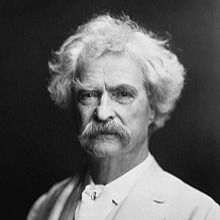Mark Twain's Speeches by Mark Twain, is part of the HackerNoon Books Series. You can jump to any chapter in this book here. AN UNDELIVERED SPEECH
AN UNDELIVERED SPEECH
The steamship St. Paul was to have been launched from Cramp’s
shipyard in Philadelphia on March 25, 1895. After the
launching a luncheon was to have been given, at which Mr.
Clemens was to make a speech. Just before the final word was
given a reporter asked Mr. Clemens for a copy of his speech to
be delivered at the luncheon. To facilitate the work of the
reporter he loaned him a typewritten copy of the speech. It
happened, however, that when the blocks were knocked away the
big ship refused to budge, and no amount of labor could move
her an inch. She had stuck fast upon the ways. As a result,
the launching was postponed for a week or two; but in the mean
time Mr. Clemens had gone to Europe. Years after a reporter
called on Mr. Clemens and submitted the manuscript of the
speech, which was as follows:
Day after to-morrow I sail for England in a ship of this line, the Paris. It will be my fourteenth crossing in three years and a half. Therefore, my presence here, as you see, is quite natural, quite commercial. I am interested in ships. They interest me more now than hotels do. When a new ship is launched I feel a desire to go and see if she will be good quarters for me to live in, particularly if she belongs to this line, for it is by this line that I have done most of my ferrying.
People wonder why I go so much. Well, I go partly for my health, partly to familiarize myself with the road. I have gone over the same road so many times now that I know all the whales that belong along the route, and latterly it is an embarrassment to me to meet them, for they do not look glad to see me, but annoyed, and they seem to say: “Here is this old derelict again.”
Earlier in life this would have pained me and made me ashamed, but I am older now, and when I am behaving myself, and doing right, I do not care for a whale’s opinion about me. When we are young we generally estimate an opinion by the size of the person that holds it, but later we find that that is an uncertain rule, for we realize that there are times when a hornet’s opinion disturbs us more than an emperor’s.
I do not mean that I care nothing at all for a whale’s opinion, for that would be going to too great a length. Of course, it is better to have the good opinion of a whale than his disapproval; but my position is that if you cannot have a whale’s good opinion, except at some sacrifice of principle or personal dignity, it is better to try to live without it. That is my idea about whales.
Yes, I have gone over that same route so often that I know my way without a compass, just by the waves. I know all the large waves and a good many of the small ones. Also the sunsets. I know every sunset and where it belongs just by its color. Necessarily, then, I do not make the passage now for scenery. That is all gone by.
What I prize most is safety, and in the second place swift transit and handiness. These are best furnished, by the American line, whose watertight compartments have no passage through them; no doors to be left open, and consequently no way for water to get from one of them to another in time of collision. If you nullify the peril which collisions threaten you with, you nullify the only very serious peril which attends voyages in the great liners of our day, and makes voyaging safer than staying at home.
When the Paris was half-torn to pieces some years ago, enough of the Atlantic ebbed and flowed through one end of her, during her long agony, to sink the fleets of the world if distributed among them; but she floated in perfect safety, and no life was lost. In time of collision the rock of Gibraltar is not safer than the Paris and other great ships of this line. This seems to be the only great line in the world that takes a passenger from metropolis to metropolis without the intervention of tugs and barges or bridges—takes him through without breaking bulk, so to speak.
On the English side he lands at a dock; on the dock a special train is waiting; in an hour and three-quarters he is in London. Nothing could be handier. If your journey were from a sand-pit on our side to a lighthouse on the other, you could make it quicker by other lines, but that is not the case. The journey is from the city of New York to the city of London, and no line can do that journey quicker than this one, nor anywhere near as conveniently and handily. And when the passenger lands on our side he lands on the American side of the river, not in the provinces. As a very learned man said on the last voyage (he is head quartermaster of the New York land garboard streak of the middle watch),
“When we land a passenger on the American side there’s nothing betwix him and his hotel but hell and the hackman.”
I am glad, with you and the nation, to welcome the new ship. She is another pride, another consolation, for a great country whose mighty fleets have all vanished, and which has almost forgotten what it is to fly its flag to sea. I am not sure as to which St. Paul she is named for. Some think it is the one that is on the upper Mississippi, but the head quartermaster told me it was the one that killed Goliath. But it is not important. No matter which it is, let us give her hearty welcome and godspeed.
About HackerNoon Book Series: We bring you the most important technical, scientific, and insightful public domain books.
This book is part of the public domain. Mark Twain (2004). Mark Twain's Speeches. Urbana, Illinois: Project Gutenberg. Retrieved October 2022 https://www.gutenberg.org/cache/epub/3188/pg3188-images.html
This eBook is for the use of anyone anywhere at no cost and with almost no restrictions whatsoever. You may copy it, give it away or re-use it under the terms of the Project Gutenberg License included with this eBook or online at www.gutenberg.org, located at https://www.gutenberg.org/policy/license.html.

